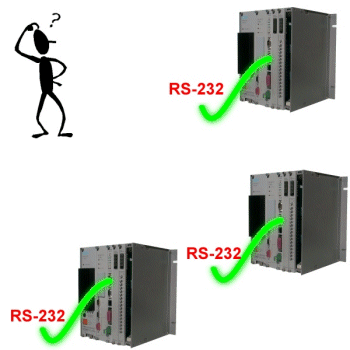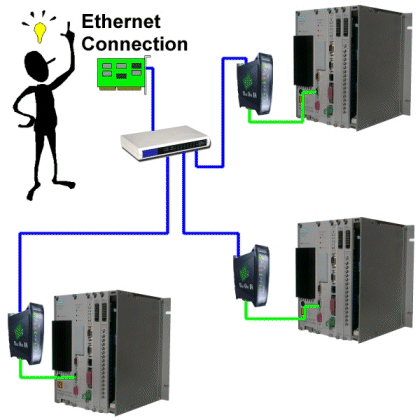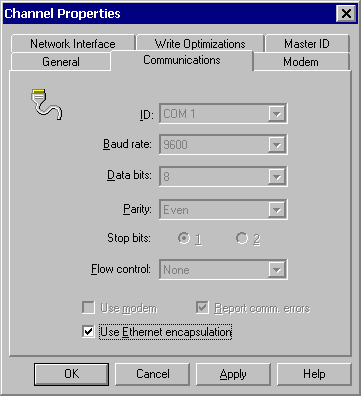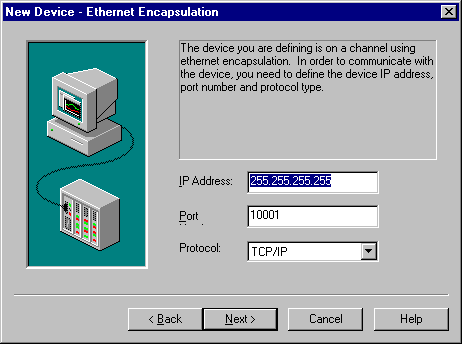What is Ethernet Encapsulation?
Like any great piece of new technology it's important to understand what it is before one
can determine how to use it, but before we dig into what Ethernet Encapsulation is let's
start with a possible real world scenario.
You arrive at the plant one day,
check the work order and find that the IT department wants to gather data from each
machine on the plant floor, and they want it quick. The IT guys think this will be easy
since they dictated that Ethernet cabling be strung through out the plant. Unfortunately
all of your existing PLCs only have serial connections.

In the not too distant past you
would have had to contemplate running new wiring to each PLC assuming the distances
weren't too far. Another option would have been to use costly radio modems. Still you knew
there had to be a better way using the plants existing Ethernet wiring.
That's where terminal servers from
companies like Digi and Lantronix come to your rescue. A
terminal server is essentially a virtual serial port. More importantly a virtual serial
port that can sit on your existing Ethernet network.

After learning of terminal server
devices, you begin to breath a little easier. The task of connecting all of your
controllers just took a big step back into the realm of reality. You will be able to place
a terminal server next to each machine gathering operational data directly from the serial
ports of the controller, and bring that data back to the IT guys via their Ethernet
cabling. Problem solved and you're a hero (until tomorrow).
Now that you have an idea of what
type of problems can be solved by using a terminal server device we can explain what
Ethernet Encapsulation is and how Kepware has added this technology to make your job
easier. If you are already familiar with terminal servers you may also know that many of
them supply accompanying software that allows the terminal server to appear like a serial
port to your operating system. This software can make using a terminal server very easy
and wouldn't have required Kepware to make any changes to our software, except for one
thing, timing.
Many of the devices in the
industrial market have very complicated protocols. A protocol is a specification that
determines how we talk to the device. In many cases there are also some very tight timing
requirements that must be met in order to successfully communicate with the device. Taking
these things into consideration the software that often accompanies terminal server
devices has not been optimized to work with the requirements of the plant floor
environment. This is usually seen as frequent communications errors, continuous breaks in
the communications, and long delays while the supplied software reconnects to the terminal
server. All of these problems can make your use of a terminal server less than ideal.
Ethernet Encapsulation
Ethernet Encapsulation is the enhanced ability of KEPServerEX serial drivers to
communicate directly with terminal servers. As described in the previous section, we could
have used the software supplied with the terminal server, but this would not have yielded
the most optimal result in terms of performance or reliability. With this in mind Kepware
has incorporated the functions needed to directly connect to a serial device connected to
an Ethernet based terminal server.
If you are familiar with our serial drivers you already know we let you select a serial
port number from 1 to 100 when configuring a channel. For drivers that support Ethernet
Encapsulation you will now find that you also have the option of selecting "Ethernet
Encapsulation" mode. The following dialog demonstrates how this selection is
presented:

Configuring the channel for Ethernet Encapsulation mode is only half of the story. As with
any Ethernet based connection you must also specify an IP address, a port number, and the
Ethernet communications format to be used. This is done when you add a new device to your
channel.
When a new device is
added to the channel the Ethernet Encapsulation settings will allow you to select an
Ethernet IP address, an Ethernet Port number, and the Ethernet protocol to be used. The
device dialog for Ethernet Encapsulation appears as follows:

This dialog appears on
the properties of each device you add to a channel in Ethernet Encapsulated mode. Since
this dialog appears for each device, you can have hundreds of serial devices connected to
your Ethernet network.
Important Note:
When you select Ethernet Encapsulation mode you will notice that the serial port settings
such as baud rate, data bits, and parity become greyed out. This occurs because these
settings will not be used in Ethernet Encapsulation mode. The terminal server you are
using must however have its serial port properly configured to match the requirements of
the serial device you plan to attach to the terminal server.
Drivers that support
this function will have a small Ethernet Encapsulation Icon on their respective online
datasheets.
 |
= Ethernet
Encapsulation Support |
Visit our OPC Server List page to determine if the driver you need
supports this feature. If you have further questions regarding how Ethernet Encapsulation
works or how you can use it to solve your next tough communications task please contact us. If it sounds like Ethernet Encapsulation is your
ticket to beating your next connectivity challenge, download our free demo version of
KEPServerEX and give it a try.
Note:
Ethernet Encapsulation mode has been designed and tested using the Digi IA Series, and the
Lantronix DR1 CoBox. The features developed will also work with other terminal server
devices that support operational characteristics similar to the products listed above. If
your terminal server supports a raw TCP mode it should work with this feature.
|
![]()
![]()
vistor counter